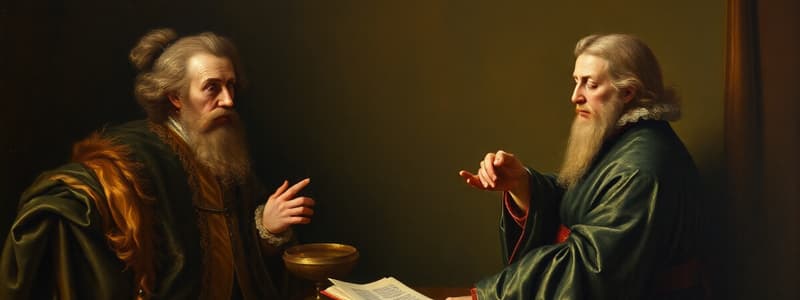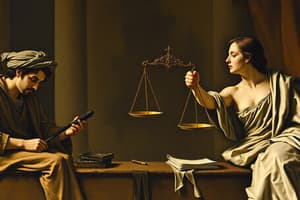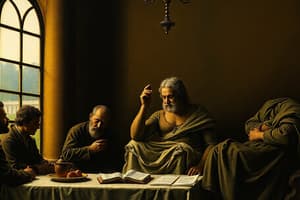Podcast
Questions and Answers
According to Rawls's broader theory, what is a key characteristic of a legitimate power structure?
According to Rawls's broader theory, what is a key characteristic of a legitimate power structure?
- The maximization of executive authority to ensure stability and order.
- The concentration of power in a single, efficient branch for decisive governance.
- A system where power is distributed to prevent any single branch from dominating. (correct)
- Unrestrained power of the judiciary to uphold the rule of law.
How does the concept of the 'original position' relate to the issue of concentrated power?
How does the concept of the 'original position' relate to the issue of concentrated power?
- It argues that a system of concentrated power is necessary to protect societal interests.
- It explicitly advocates for a system where a single branch holds supreme power for efficiency.
- It supports the idea that rational individuals, behind a veil of ignorance, would choose a system where power is not unfairly concentrated. (correct)
- It suggests that power should be concentrated in the executive to guarantee social order.
Which aspect of Rawls's theory is most directly undermined by concentrated power in a single branch of government?
Which aspect of Rawls's theory is most directly undermined by concentrated power in a single branch of government?
- The ability of the ruling elite to maintain control and stability.
- The preservation of historical traditions and established norms.
- The protection of fundamental rights and accountability to all citizens. (correct)
- The efficiency of governance and quick decision-making processes.
Why would Rawls's principles of justice likely find a system with unlimited judicial power to be problematic?
Why would Rawls's principles of justice likely find a system with unlimited judicial power to be problematic?
Which of the following best describes how Rawls approaches the design of governmental power structures?
Which of the following best describes how Rawls approaches the design of governmental power structures?
What is the primary concern highlighted by Rawls's arguments about concentrated power?
What is the primary concern highlighted by Rawls's arguments about concentrated power?
According to the principles of justice in Rawls's theory, what is the role of independent review mechanisms within a political system?
According to the principles of justice in Rawls's theory, what is the role of independent review mechanisms within a political system?
Why does Rawls' work implicitly suggest a rejection of systems with unfairly concentrated power?
Why does Rawls' work implicitly suggest a rejection of systems with unfairly concentrated power?
Flashcards
Rawls's Concept of Power Distribution
Rawls's Concept of Power Distribution
Rawls's theory emphasizes fairness and equality in the distribution of power within a society. It argues that a just society should prevent tyranny and exploitation by ensuring a balanced distribution of power.
Concentration of Power: A Problem
Concentration of Power: A Problem
Rawls's theory suggests that concentrated power in one branch of government, like the judiciary or executive, is problematic because it can lead to abuses of power and violate principles of fairness.
Checks and Balances: Essential for Fairness
Checks and Balances: Essential for Fairness
Rawls emphasizes the need for checks and balances and independent review mechanisms to ensure that no single branch of government gains excessive power.
Power Responsiveness to Citizens
Power Responsiveness to Citizens
Signup and view all the flashcards
Original Position and Power Concentration
Original Position and Power Concentration
Signup and view all the flashcards
Individual Rights and Power Concentration
Individual Rights and Power Concentration
Signup and view all the flashcards
Rawls's Focus: Just Institutions, Not Detailed Power Structures
Rawls's Focus: Just Institutions, Not Detailed Power Structures
Signup and view all the flashcards
Evaluating Power Structures through Rawls's Principles
Evaluating Power Structures through Rawls's Principles
Signup and view all the flashcards
Study Notes
Rawls on Power Concentration
- Rawls's theory doesn't directly address the specific issue of power being held solely by the judiciary or executive. His focus is on justice and fairness in the political system, not detailed institutional design.
- Rawls's principles of justice, outlined in A Theory of Justice, provide a framework for evaluating power structures' legitimacy. The implications of his principles suggest issues with concentrated power, even if not explicitly focused on which body holds power.
- A just society, in Rawls's view, is grounded in fairness and equality, implying a power distribution preventing tyranny and exploitation.
- Legitimate power structures must be constrained and responsive to all citizens' needs. Concentrated power in one branch (like judiciary or executive) violates fairness principles.
- Rawls's theory suggests the best government structure minimizes the dominance of one branch. This relates to "rule of law" and checks and balances, though not explicitly defined.
- A system dominated by one branch inevitably risks abuse of power. This highlights the need for checks and balances and independent oversight mechanisms.
- Rawls focuses on designing just institutions, not on detailing power structures within them. His concepts of larger societal fairness and justice provide context for judging concentrated power.
- His "original position" suggests rejecting power concentrated in a small group because such a system wouldn't be chosen by rational individuals in a "veil of ignorance."
- A key element of Rawls's theory is individual rights. Concentrated power in one branch compromises these rights, by limiting accountability.
- An independent judiciary upholds the rule of law, aligning with Rawls's justice principles. However, judicial dominance, potentially at the expense of the legislative or executive, is problematic in terms of fairness.
- Rawls's work implies concentrated executive or judicial power is unjust, harmful to abuse of power prevention and individual rights.
- A just system promotes participation and representation across all institutions. Concentrated power in one body inhibits participation and representation.
Studying That Suits You
Use AI to generate personalized quizzes and flashcards to suit your learning preferences.





